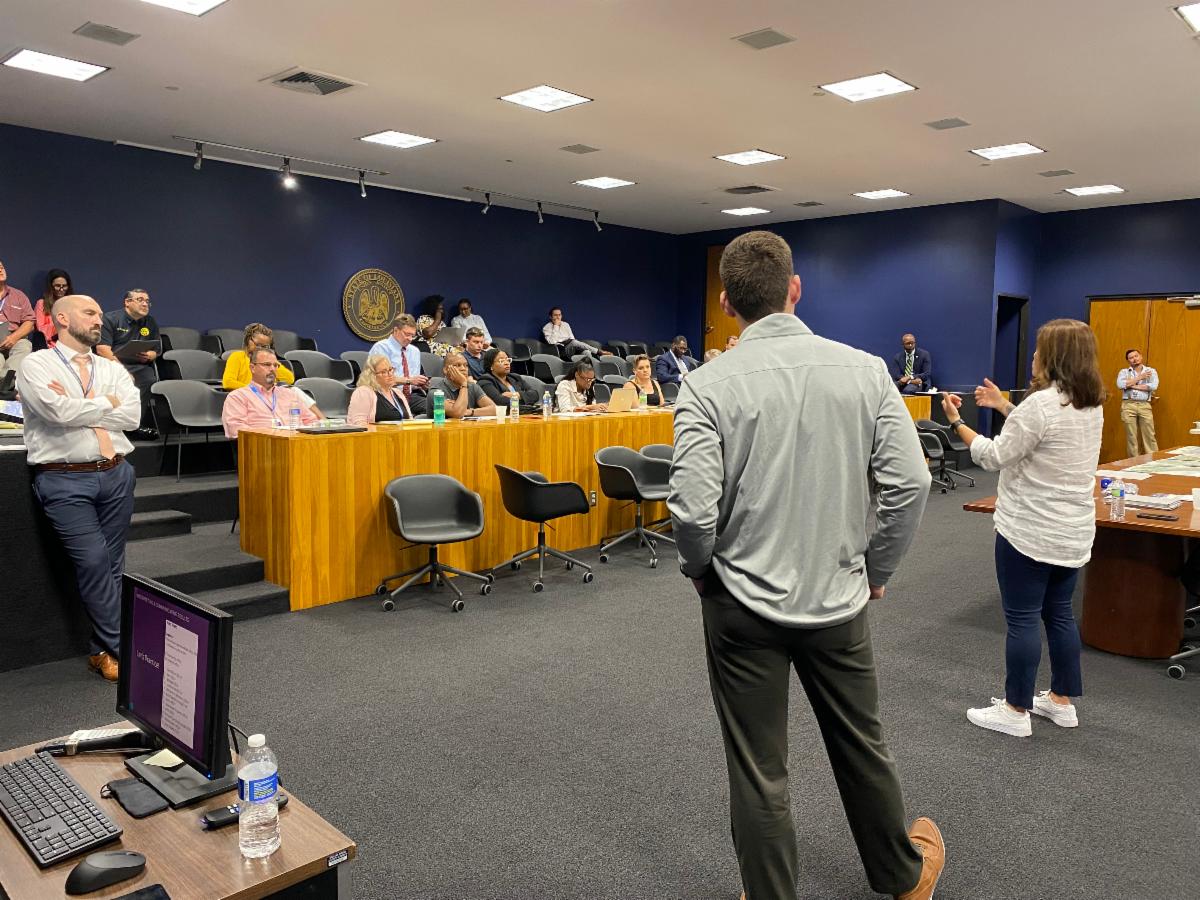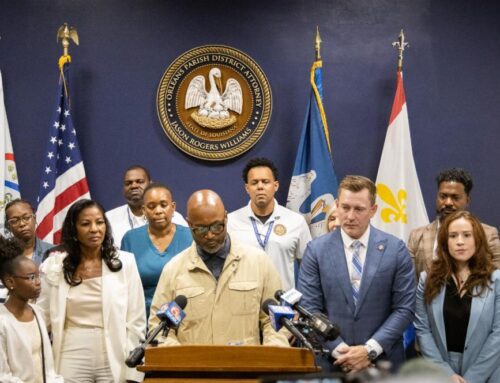NEW ORLEANS – Last week, the Orleans Parish District Attorney’s Office (OPDA) in partnership with Simsi Inc. hosted representatives from the New Orleans Police Department (NOPD), New Orleans City Council, City Attorney’s Office, Metropolitan Crime Commission (MCC), Vera Institute, Department of Code Enforcement, NOLA Coalition, Office of Information Technology and Innovation GIS Team, Office of Criminal Justice Coordination, Police and Justice Foundation, Office of Nighttime Economy, Louisiana Chamber of Commerce, Black Chamber of Commerce and other stakeholder agencies for a workshop discussing how to use Risk Terrain Modeling (RTM) in the City of New Orleans, data analysis, resource deployments, prevention, and Data-Informed Community Engagement (DICE).
Hosted and facilitated by OPDA Chief of Screening Andre Gaudin Jr., Captain Jonas Baughman, a 20-year veteran of the Kansas City, Missouri Police Department, and Simsi, Inc. Director of Client Accounts and Services Adriana Santos, participants learned how RTM works, reviewed case studies, and shared practical insights for implementation during the interactive workshop.
“My office is committed to attacking our City’s violent crime problem in ways that have lasting and positive impacts on our residents and neighborhoods. The evolving nature of criminal activity requires that we adopt innovative methodologies and use 21st Century tools to tackle the root causes of the violence facing our community. My administration is exploring all opportunities to bring new public safety tools to New Orleans that will enable OPDA and our partners to better forecast elements of criminality and employ strategies to make our community safer for all residents,” said District Attorney Jason Williams. “Risk terrain modeling is a crime prevention tool which identifies environmental conditions that contribute to crime problems. This data-focused approach allows law enforcement, service providers and City departments to strategically deploy resources in a way that holistically addresses centers for criminality, homelessness and chronic blight. I’m truly excited for our office to have this kind of tool that not only gives context on why crime is happening but also involves community members and other stakeholders to remedy the problems through a collaborative community lift.”
RTM is risk assessment for places and diagnoses crime patterns. It identifies environmental conditions that contribute to crime problems. RTM drives decision-making and action for public safety.
OPDA Screening Chief Andre Gaudin Jr. said, “Through this endeavor our office seeks to ensure the public safety for the people of New Orleans is guaranteed by data-informed effective crime prevention strategies that will produce a positive impact on crime in our city. Risk terrain modeling helps law enforcement increase safety by adding context to how we can improve our decision-making for the well-being of every resident in New Orleans.”
Under a grant from the Bureau of Justice Assistance (BJA), OPDA has partnered with Dr. Joel Caplan of Rutgers University to deploy RTM in the City of New Orleans. RTM has been tested in small and large cities throughout the United States. Research funded by the U.S. Department of Justice resulted in large crime reductions where RTM was used to direct police patrols and other non law enforcement strategies. Robbery decreased by 42%, gun violence reduced by 35%, and motor vehicle theft reduced by 33%, to cite a few examples.
Captain Jonas Baughman said, “One of RTM’s biggest strengths is it levels the playing field for all partners involved in public safety efforts. Instead of traditional crime reduction approaches led solely by criminal justice organizations, RTM and DICE give all stakeholders a voice in how to collectively deploy resources to areas of greatest need of support. In the end, DICE is far more than just sharing data; rather, data is the mechanism that fosters genuine collaboration and problem-solving.”
Simsi, Inc. Director of Client Accounts and Services Adriana Santos said, “With a place-based approach to crime prevention, RTM helps spearhead public safety conversations to mobilize resources and expertise where needed most. It’s a powerful tool that informs Data-Informed Community Engagement efforts which promote collaboration and enhance resource coordination. As a community-centric approach, DICE helps strengthen public relations and enables community partners to take an active role in improving public safety.”
To learn more, please visit orleansda.com.
###




